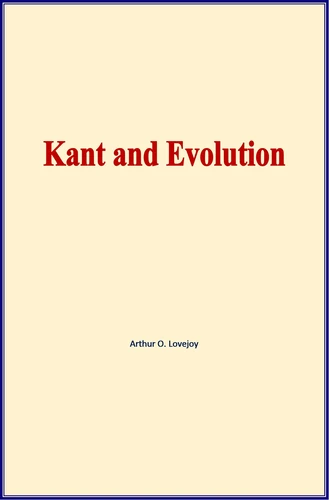Kant and Evolution
Par :Formats :
Disponible dans votre compte client Decitre ou Furet du Nord dès validation de votre commande. Le format Multi-format est :
- Pour les liseuses autres que Vivlio, vous devez utiliser le logiciel Adobe Digital Edition. Non compatible avec la lecture sur les liseuses Kindle, Remarkable et Sony
 , qui est-ce ?
, qui est-ce ?Notre partenaire de plateforme de lecture numérique où vous retrouverez l'ensemble de vos ebooks gratuitement
Pour en savoir plus sur nos ebooks, consultez notre aide en ligne ici
- FormatMulti-format
- ISBN978-2-36659-591-8
- EAN9782366595918
- Date de parution12/04/2018
- Protection num.NC
- Infos supplémentairesMulti-format incluant ePub avec ...
- ÉditeurLiterature and Knowledge Publish...
Résumé
It has come to be one of the generally accepted legends of the history of science that Kant was also a pioneer of evolutionism. In the anthropological essays of the Koenigsberger, for example, we already find the most essential conceptions of the modern theory of descent indicated, at least in germ - and, indeed, in a way that marks Kant out as a direct precursor of Darwin." The same expositor says: "Throughout these writings the idea of evolution plays everywhere the same rôle as in contemporary science....
The series of organisms is for Kant in a constant flux, in which the seemingly so stable differentiæ of genera and species have in reality only a relative and subsidiary significance." And in a famous passage of the "Kritik der Urteilskraft, " says another writer, "the present-day doctrine of descent is clearly expressed in its fundamental features." Haeckel, who is in the main followed by Osborn, goes even farther in his ascription of Darwinian and "monistic" ideas to Kant's earlier works, though he thinks that in later life Kant fell from grace...
The series of organisms is for Kant in a constant flux, in which the seemingly so stable differentiæ of genera and species have in reality only a relative and subsidiary significance." And in a famous passage of the "Kritik der Urteilskraft, " says another writer, "the present-day doctrine of descent is clearly expressed in its fundamental features." Haeckel, who is in the main followed by Osborn, goes even farther in his ascription of Darwinian and "monistic" ideas to Kant's earlier works, though he thinks that in later life Kant fell from grace...
It has come to be one of the generally accepted legends of the history of science that Kant was also a pioneer of evolutionism. In the anthropological essays of the Koenigsberger, for example, we already find the most essential conceptions of the modern theory of descent indicated, at least in germ - and, indeed, in a way that marks Kant out as a direct precursor of Darwin." The same expositor says: "Throughout these writings the idea of evolution plays everywhere the same rôle as in contemporary science....
The series of organisms is for Kant in a constant flux, in which the seemingly so stable differentiæ of genera and species have in reality only a relative and subsidiary significance." And in a famous passage of the "Kritik der Urteilskraft, " says another writer, "the present-day doctrine of descent is clearly expressed in its fundamental features." Haeckel, who is in the main followed by Osborn, goes even farther in his ascription of Darwinian and "monistic" ideas to Kant's earlier works, though he thinks that in later life Kant fell from grace...
The series of organisms is for Kant in a constant flux, in which the seemingly so stable differentiæ of genera and species have in reality only a relative and subsidiary significance." And in a famous passage of the "Kritik der Urteilskraft, " says another writer, "the present-day doctrine of descent is clearly expressed in its fundamental features." Haeckel, who is in the main followed by Osborn, goes even farther in his ascription of Darwinian and "monistic" ideas to Kant's earlier works, though he thinks that in later life Kant fell from grace...



